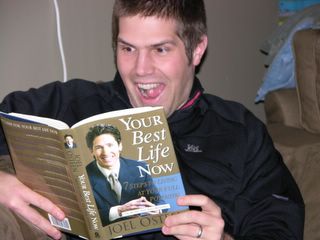On McLaren's website about a month ago, he mentioned that his newest book,
The Secret Message of Jesus, was coming out soon, and that the publishers wanted to give out some free copies to bloggers who would review it on their blogs and on Amazon. I replied, expecting very little after an incident with Doug Pagitt's
Preaching Reimagined. But then one day it arrived. So now I have to actually be a man of my word and say some words about the book (and no, they didn't tell me to say nice things about it). I've had weird experiences writing reviews on Amazon, but we'll leap that hurdle when it comes. For now, here's some thoughts:
Upon receiving
The Secret Message of Jesus I was immediately struck with a strange fear by the title alone: had McLaren slipped into some sort of gnosticism? Of course, that wasn't it at all, though I would have to say that the title does not do justice to the book and quite often it felt like he was trying to twist what he was saying in the book to fit the title in nicely, which it didn't. But that is just secondary stuff to the book itself. This is a book about the Kingdom of God, which makes it invaluable in a society where that Kingdom has been ignored or replaced by the average believer.
If you are at all aware of the people McLaren reads and is influenced by, this book comes as no surprise. Particularly, N.T. Wright and Walter Wink have been writing about the Kingdom for years and their influence is obvious. Of course he also uses C.S. Lewis, Martin Luther King Jr, and, to a lesser degree, Walter Brueggemann, Jurgen Moltmann, and possibly even Crossan, though he is not often quoted. What I'm saying is that if you are a follower of some of these writers, McLaren doesn't necessarily have much to add, though he does do a fine job of boiling down and mixing their thoughts for the everyday Christian looking to live into the Kingdom, which I'm sure is what he is looking to do.
The Secret Message does a wonderful job of putting Jesus into his context within first century Palestine. McLaren points out the beliefs and actions of different groups from his time/location, from Essenes to Herodians to Pharisees. It is looking at these different groups, as well as the political situation of his country at the time and their struggle to make sense of being "God's chosen people" while under Roman conquest, that he can talk about Jesus' political, Jewish, revolutionary and "hidden" message.
Beyond the context of Jesus' life, McLaren also brings Paul into the picture and shows how Paul works within the kingdom framework provided by Jesus, rather than preaching his own gospel as some believe.
The most important thing about
The Secret Message to me is this: Brian McLaren has written a book that seems far less controversial than usual, which makes it clear that the gospel is about participating in God's kingdom, both now and eternally, and is something much richer than heaven after you die. He brings the historical Jesus into today and asks the hard questions about what the Kingdom of God looks right now, about where it is breaking into our kingdoms. He creatively brings up different ways of referring to this Kingdom, such as God's dream, revolution, mission, network, and more.
My one problem that I often have with people referring to God's Kingdom, and this unfortunately often includes me when I'm not thinking things through, is that we get so excited about God's Kingdom that we forget the particulars Jesus said about it and focus on the parts we like more. McLaren used more Biblical passages than I'm used to seeing in his works, but I honestly think he could have gone even further, which is a big thing for me to say. Whenever I teach on the Kingdom, I'm blown away by what I think it is and what Jesus says the most about it. My hope is that the readers of this book would go to the Biblical text itself and read the gospels, as well as the entire New Testament (then the entire Bible even), keeping God's Kingdom in mind as they read.
Complaints aside, I would still say this is a good read. Let me put it this way to close: if every person on this planet read this book, the world would be a better place and the Kingdom would be more apparent than I've ever seen. This is a good introduction into current thinking on the Kingdom and a great reminder to all Christians about what our calling really is.
I'd be glad to answer any questions about the book, or to engage in any sort of discussion about God's Kingdom if anybody's interested.
Peace,
Matt
Currently Reading:
Systematic Theology, vol. 2: Existence and the Christ by Paul Tillich. I'm amazed at how volume two is even better than volume one! Tillich's existential theology is brilliant, fascinating, and more important for today than most people seem to realize. I first read him while studying under Stan Grenz, and now realize how important he could be for postmodern theologians. If I ever do more theology work, he may be the man I choose to study. Of course, I have too many interests to say that for sure...












